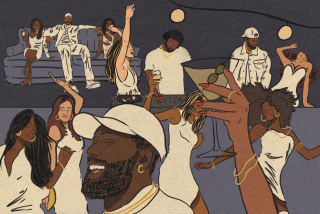Let’s Not Indulge Society’s ‘Chocolate’ Fantasies
- Share via
The photo caught my eye immediately: actress Jada Pinkett on the cover of the September issue of Buzz magazine. She’s young, gifted, black--and very nearly naked. If Buzz had, in the past, run similar photos of other female celebrities (Claire Danes, Posey Parker, Sandra Bullock), it wouldn’t have been so bad. But those women were clad in designer duds, while Pinkett shone forth draped at the hips in a fishnet shawl, wearing only earrings and an arm strategically placed over two obviously naked breasts.
“So what?” you say. “Demi Moore posed naked for Vanity Fair, twice. Madonna had a whole book devoted to nude photos of herself. Some actresses are just exhibitionists.” And you’d be right in that observation.
But Pinkett is a black actress, and fair or not, there’s some baggage that comes with being one. For black women, period, so much of our lives is spent disavowing the wanton-hussy stereotype that American society has bestowed on us, the better to justify indulgence in its chocolate fantasies. If we weren’t safe, asexual mammies, we were placed at the other end of the spectrum, the ever ready woman, no morals, no scruples, no reservations about giving you a good time. (And isn’t it interesting that some of the people most staunchly interested in preserving the stereotype were practitioners of segregation by day and avid, covert integrationists at night?)
Early black actresses were haunted by the dichotomy. Hollywood offered women like Ethel Waters and Hattie McDaniel roles--as maids. On the flip side, it cast Dorothy Dandridge as a temptress who few men could or wanted to resist. In the end, Dandridge’s inability to be cast as anything but a sexy vixen spurred her to an early death by suicide.
There was, however, a silver lining: Struggles that those earlier actresses endured opened the doors for later generations. And while there are still too many mammies and sepia sex bombs in the cinematic panoply for my taste, other options are evolving, too. Black actresses are winning parts as “normal” wives and mothers, lawyers, action-heroines and businesswomen. And every nonstereotypic portrayal helps to chip away at the huge chunk of stereotype that remains.
And there’s still a huge chunk. Virtually every black woman I know has a story to tell of being approached by a man--usually not a black man--who propositions her. A man sidled up to a pinstriped, briefcase-toting attorney on the way to court and made a distinctly indecent proposal. A suburban mother dropping her three children off at their elementary school was subjected to tawdry advances while waiting at a traffic light. A psychologist in semi-formal dress was devastated, while waiting for an elevator in a hotel lobby, to hear two businessmen speculate on what it would cost to enjoy her services.
That last story belongs to Gail Elizabeth Wyatt, a UCLA psychologist whose new book is titled, “Stolen Women: Reclaiming Our Sexuality, Taking Back Our Lives.” “Centuries ago,” Wyatt says, “black women were sold on auction blocks; and 500 years later, that’s still all people know about us. We’re a commodity. Expendable.” The only pedestal we’ve been placed on had a “for sale” sign attached to it.
Entertainers like Pinkett and singer Toni Braxton (who appeared nude, straddling a chair for a recent Vibe magazine cover and as a nude centerfold for People’s annual “50 Most Beautiful” issue) “don’t seem to understand our history,” says Wyatt. “Our ancestors wept when they were paraded, naked, before strangers. These women are doing it with a smile.”
Which brings me back to Miss Jada. According to the Buzz article, she has a body to die for, a megawatt smile and considerable talent that is propelling her on an upward trajectory. We know from the interview that she loves to shop. So why couldn’t she wear some of her substantial purchases for the photo shoot? And we know she feels that black actors, according to her, “don’t have that luxury” of doing what they want without thinking of how their portrayals affect the larger black community. Guess she decided that after she removed her clothes.
Buzz, indulging in its own chocolate fantasy, has been casually heedless of the insult it has extended to black women. But the Buzz editors aren’t black, so their community’s image wasn’t assaulted; they cannot be blamed for not giving much of a damn. Miss Jada, on the other hand, doesn’t have that excuse.
More to Read
The biggest entertainment stories
Get our big stories about Hollywood, film, television, music, arts, culture and more right in your inbox as soon as they publish.
You may occasionally receive promotional content from the Los Angeles Times.










